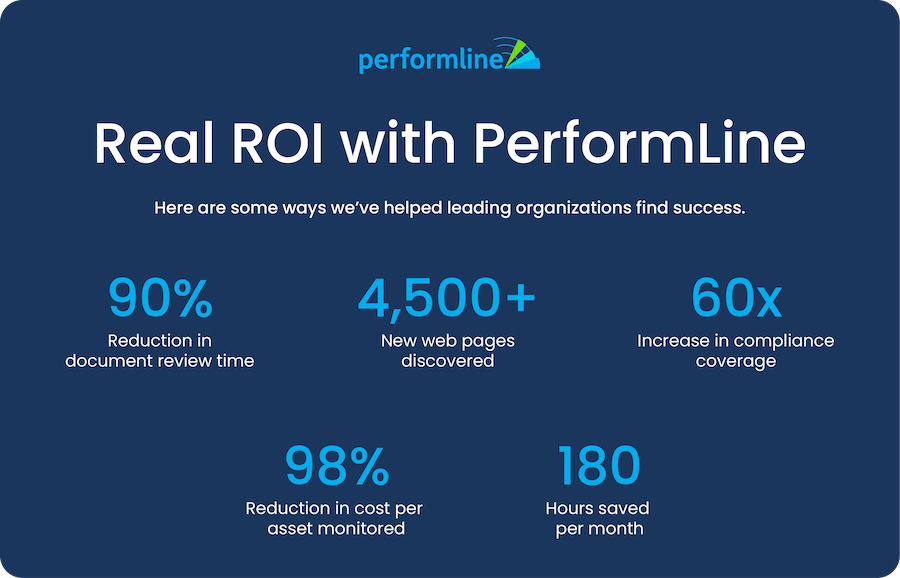Why Marketing Compliance Technology is a Strategic Investment, Not an Expense

TL;DR: Why marketing compliance tech is worth it
- Compliance technology reduces risk, saves time, and protects brand trust by ensuring marketing materials meet regulatory and brand standards across all channels
- The cost of non-compliance can exceed millions in federal and state fines, plus long-term damage to consumer trust and brand reputation
- Automated compliance reviews accelerate campaign approvals, helping marketing teams launch faster without back-and-forth delays
- Compliance isn’t just about avoiding penalties—it’s a growth enabler, supporting faster expansion into new channels and building consumer confidence
- PerformLine offers centralized, scalable oversight, enabling consistent compliance monitoring across the web, social media, emails, affiliate marketing, and more
Consumer finance companies are constantly balancing profitability with regulatory and marketing compliance.
In 2025, some companies may assume that regulatory pressure is easing due to budget cuts at agencies like the Consumer Financial Protection Bureau (CFPB). But, compliance risks aren’t going away—state regulators are stepping in, private lawsuits are surging, and marketing missteps can lead to financial and reputational disaster.
Despite these challenges, many companies still view compliance as a cost center rather than a competitive advantage.
A recent survey found that compliance professionals struggle with keeping up with regulatory changes, manual review processes, and resource constraints. While 56% believe technology can help, 44% still report challenges in securing budget approval and leadership buy-in for compliance initiatives.
Forward-thinking companies recognize compliance technology not as a cost center but as a powerful strategic lever. Marketing compliance technology, like PerformLine, enables growth by reducing risk, accelerating go-to-market timelines, and building consumer trust.
The true cost of non-compliance
Former U.S. Deputy Attorney General Paul McNulty famously said:
If you think compliance is expensive, try non-compliance.
While compliance can often be perceived as an expense, the consequences of non-compliance far outweigh the upfront cost of a strong compliance program.
The monetary costs
Non-compliance is expensive.
Over the past five years, state and federal regulators have imposed more than $10 billion in monetary fines against consumer finance companies for consumer protection-related violations:
- The average state regulatory fine exceeds $41 million
- The average federal regulatory fine surpasses $67 million
- For leading U.S. banks, the average cost of an enforcement action is over $636 million
Yet, the direct financial penalties are often just the beginning.
The cost of consumer mistrust
When compliance issues make headlines, the fallout goes beyond monetary fines.
Negative headlines and social chatter can shake consumer confidence. Studies show that consumers who have been misled by one advertisement develop skepticism toward all ads, regardless of the brand.
Misleading claims, unclear disclosures, or even missing information in marketing and promotional materials can financially harm consumers.
And, when consumers feel misled, they’re more likely to file complaints, share negative experiences online, and damage a brand’s reputation–and bottom line.
Once trust is broken, rebuilding it is costly, requiring expensive PR campaigns, damage control efforts, and lost revenue recovery.
Marketing compliance is good business, not just a check-the-box necessity
The perception of compliance has shifted over the past decade, with leading organizations recognizing its importance as a business driver.
The 2025 State of Marketing Compliance report found that compliance is deeply embedded in most organizations’ cultures, with many also prioritizing cross-departmental marketing compliance training.
Research also highlights the link between strong compliance practices and consumer trust:
- 30% of respondents cited compliance as the most important factor in building trust
- Transparency followed closely at 26%
Both of these are key pillars of marketing compliance.
Industry experts agree:
There’s really, I think, a direct correlation between having satisfied customers, which can be very much related to the function and operational effectiveness of your compliance program, and that actually leads to business growth.
– Ethan Singleton, FS Vector
I think there’s a lot of distrust among consumers. First, it was with large banks, and now it’s with big tech. When consumers see negative news, it drives business away. I think everyone involved—your customers, business partners, and bank partners—won’t be willing to work with you or help your business grow unless you have that really buttoned up.
– Kimberly Monty Holzel, Goodwin
Leading players in the space are increasingly integrating compliance into their core business strategy. For example:
- JPMorgan Chase emphasizes that “good compliance is good business,” incorporating it into their “How We Do Business” principles
- Wells Fargo has stated that “building the right risk and control infrastructure remains our top priority,” reaffirming its compliance commitment for 2025 and beyond
- Cross River embraces compliance as a strategic business value and trumpets the fact that a compliance-first approach helps future-proof operations for fintechs and their ecosystem of partners
How marketing compliance technology transforms operations
PerformLine’s omni-channel marketing compliance technology helps organizations streamline oversight, reduce risk, and maintain brand integrity across all marketing channels.
- Automation for Faster Approvals: Instead of manually reviewing every ad, email, or landing page, PerformLine scans for compliance risks, speeding up approvals while improving accuracy
- Centralized Workflows: A single platform houses brand, legal, and regulatory guidelines, ensuring consistency across marketing assets. If regulators request documentation, everything is easily accessible
- Real-Time Issue Detection: Compliance issues are flagged continuously, preventing violations before they escalate
- Scalability for Growth: PerformLine integrates across paid ads, social media, direct mail, and affiliate channels, enabling compliance management at scale
Strategic advantages of marketing compliance technology
The benefit of PerformLine’s technology goes beyond operational efficiencies—it provides several strategic advantages to drive growth, such as:
- Faster Go-to-Market Timelines: Automated compliance reviews eliminate back-and-forth delays, allowing companies to launch campaigns faster
- Confidence in New Marketing Channels: Expanding into social media, influencer marketing, or affiliate networks? Compliance technology ensures regulatory adherence while unlocking new opportunities
- More Time for Strategy: By automating compliance checks, marketing teams can focus on creative initiatives rather than manual reviews
- Stronger Consumer Trust: Transparent, accurate marketing fosters brand credibility and long-term customer loyalty
- Proactive Brand Protection: Real-time monitoring helps businesses detect and address compliance risks before they impact reputation
- Better Partner Decisions: By tracking affiliate and influencer compliance, companies can confidently choose trustworthy marketing partners
The business case for marketing compliance technology
While marketing compliance programs don’t directly drive revenue growth, they still provide significant ROI and support for larger business initiatives.
PerformLine clients report:
- Significant time savings
- Comprehensive compliance coverage
- Stronger brand protection through discovery
- Faster, more efficient approvals

How much can you save with PerformLine?
Future-proof your marketing compliance strategy with PerformLine
Regulatory scrutiny isn’t going away, and the cost of non-compliance will only rise. Companies that treat compliance as a strategic advantage—not just a legal necessity—will be the ones that thrive.
By investing in marketing compliance technology like PerformLine, organizations can mitigate risk, streamline operations, and build consumer trust. The result? Faster growth, stronger brand integrity, and long-term success.
Don’t wait until compliance issues become costly problems. Take a proactive approach today.


